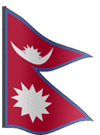Female Community Health Programme
Recognizing the importance of women's participation in promoting health of the people, GoN initiated the Female Community Health Volunteer (FCHV) Program in FY 2045/46 (1988/1989) in 27 districts and expanded to all 75 districts of the country in a phased manner. Initially, the approach was to select one FCHV per ward regardless of the population size. Later in 2050 (1993/94) population based approach was introduced in selected (28) districts. All together there are 51,416 FCHVs in the country (46,088 FCHVs at rural/VDC level and 5,328 at urban/municipality level).
FCHVs are selected by members of Mothers' Group for Health (MG‐H) with the help of local health facility staff. They are provided 18 days basic training in two phases (9+9 days) on selected primary health care components. The major role of the FCHV is to advocate healthy behaviors of mothers and community people to promote safe motherhood, child health, family planning, and other community based health promotion and service delivery. FCHVs distribute condoms and pills, ORS packets and vitamin A capsules, treat pneumonia cases and refer and serious cases to health institution along with motivation and education to community people. Similarly, they also distribute iron tablets to pregnant women.
The FCHV program strategy has been revised in 2067 (2010) which gave strategic directions and critical approaches to ensure a strengthened national program for consistency and continuous support to each FCHV.
Government of Nepal (GoN) is committed to increase the moral & participation of FCHV in community health development. In fiscal year 2064/65 MoH established FCHVs fund by providing cash support of Rs. 50,000 to each VDC. The mobilization of this fund for income generation activities is expected to benefit the FCHVs and the community at large.
Key services provided by FCHVs:
- Distribution of the family planning commodities ( pills and condoms)
- Distribution of the iron tablet to pregnant and lactating mothers
- Oral rehydration solution distribution
- Health education, communication and community outreach
- Act as linkage between the health facility and the community and provide referral services especially for maternal and new born services, CB-IMNCI services
- Provided support in home delivery cases mainly focused on initiating skin to skin contact after birth, uptake of misoprostol, and application of chlorhexidine in cord after delivery
Programme Implemented by:
Family Health Division
Department of Health Services (DoHS)
Teku, Kathmandu
T : +977 1 4262063
F : +977 1 4251173
W: http://www.fhd.gov.np

